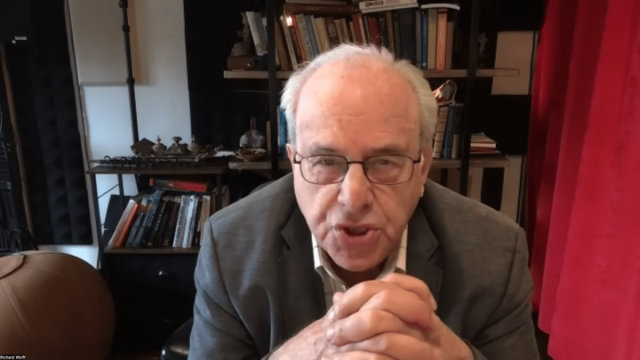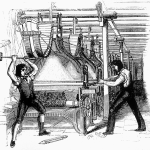
Cracks in the Colossus: How America’s 2025 Feels Uncannily Familiar.
America in 2025 mirrors the crises of fading empires: economic pain, censorship, and political theater. From ideological purges to working-class despair, Richard Wolff warns that history is repeating—and the nation stands on the brink of irreversible decline.
Richard Wolff’s sweeping analysis of the American empire’s wobbly footing in 2025, mapping eerie political and economic parallels to Weimar Germany and asking whether recent events in America echo, rhyme, or defy history’s cycle. Exploring state-led ideology crackdowns, wild economic maneuvers, rising political polarization, and the shadow of global competitors, the piece unpacks if today’s crises signal mere turbulence or terminal decline.
Picture this: It’s a sticky D.C. afternoon in 2025, and the Smithsonian’s halls are echoing, not with footsteps, but with the thud of books being pulled from shelves—labeled ‘improper ideology’ by the latest federal crusade. I remember standing there as a student years ago, marveling at the stories America wanted you to believe about itself. Today, the narrative feels brittle, rewritten in real time. What’s happening in these grand marble buildings? Richard Wolff says it’s more than politics—it’s a snapshot of a society grappling with decline, much like others before it. In this post, we peel back the velvet curtain: Are we watching history, tragedy, or farce?
Rewriting History in the Halls of Power: The New Ideological Purges
The Decline of the American Empire is no longer just a topic for historians—it’s unfolding in real time, with 2025 marking a turning point. One of the most striking developments is President Trump’s appointment of Vice President Vance to lead what many are calling the Trump Vance Smithsonian ideology purge. This move aims to root out so-called “anti-American improper ideology” from the Smithsonian, a federal institution long seen as a neutral guardian of the nation’s past. For some, this is a chilling echo of McCarthyism parallels political climate—a time when ideological conformity was enforced at the highest levels, and dissent was treated as a threat.
Richard Wolff, in his analysis of the political dissent USA 2025, draws direct lines between these new purges and the infamous House Un-American Activities Committee. He notes, “It is easy to mistake the symptoms for the cause in the unraveling of an empire.” The Smithsonian’s recent ‘ideology purge’ is not an isolated event. Across the country, universities like Columbia are seeing police called in to suppress pro-Palestinian and anti-Israel voices. In a move reminiscent of Cold War paranoia, Secretary of State Rubio announced the expulsion of 300 foreign students for their political speech—another sign of state suppression.
There’s a personal irony here. Many once believed that history museums only talked about the dead. Yet, in 2025, it seems some in power want the past itself buried alive, rewritten to fit a new narrative. The desire to control the story of America is now a tool for enforcing unity, even as cracks widen beneath the surface.
These actions are not without precedent. Wolff points to the exile of artists like Bertold Brecht and Charlie Chaplin during the original Red Scare, suggesting that Fascism in modern America is less about one leader and more about the system’s response to crisis. The crackdown on activism at major campuses and federal institutions signals a growing desperation—a need to enforce conformity as the old order falters.
Research shows that this surge in state suppression is a symptom of deeper troubles. As the American empire faces economic and political strain, the urge to rewrite history and silence dissent grows stronger, echoing the darkest chapters of the nation’s past.
When Empires Panic: Tariffs, Trade Wars, and the Cost of Your Morning Coffee
In 2025, the American empire faces a familiar crossroads—one marked by economic anxiety, political polarization, and a return to protectionist policies. Richard Wolff’s American empire decline analysis draws a sharp line between today’s trade wars and the desperate measures of past empires. Nowhere is this more visible than in the Trump administration’s “Hail Mary” tariffs: sweeping 25% duties slapped on goods from Canada and Mexico, America’s largest trading partners. These tariffs, Wolff argues, are less about reviving industry and more about projecting strength in a time of uncertainty.
The impact tariffs American economy is immediate and personal. Everyday goods—coffee, sugar, avocados, and lumber—are suddenly more expensive. Imagine standing in line for your morning coffee, only to find it costs $10, and the beans are no longer from Canada. Lumber prices soar, making home renovations or new builds unaffordable for many. These are not abstract economic shifts; they hit wallets and reshape daily life.
Tariffs are not a new tool in the American playbook. The 1960s saw the introduction of a 25% tariff on imported pickup trucks, a move that cemented the Ford pickup’s dominance for decades. But as Wolff’s Trump political economy critique points out, what worked in a different era may now backfire. Instead of boosting American industry, these new tariffs largely pass costs onto consumers, echoing what research shows about the Trump’s tariff policy failure. The result? Inflation at Starbucks, shrinking purchasing power, and a growing sense of economic dislocation.
Wolff warns that these measures risk more than just higher prices. If trade relations with Canada sour, there’s a real danger that Canadian electricity could be redirected to China, further destabilizing traditional partnerships. The ripple effects of these policies extend far beyond the checkout line.
‘Desperate empires cling to heroic economic measures—until the price trickles down to the checkout line.’ — Richard Wolff
This cycle of protectionism and economic blowback is, for Wolff, a classic symptom of imperial decline. The economic collapse under Trump is not just about numbers—it’s about the lived experience of Americans facing rising costs and shrinking options. In this environment, even something as simple as a cup of coffee becomes a symbol of broader uncertainty, and the cracks in the colossus grow ever more visible.
From Economic Anxiety to Authoritarian Dreams: The Working Class Squeeze
Richard Wolff’s political analysis draws striking historical parallels between the United States in 2025 and Germany during the 1930s. He argues that the current wave of working class disillusionment in America echoes the economic collapse and political betrayal that once fractured Weimar Germany. In both eras, the middle class endured a slow, decades-long decline, leaving ordinary people angry, anxious, and increasingly susceptible to authoritarian promises.
Wolff points to the wealth redistribution middle class crisis, referencing IRS data and the genie coefficient to show how prosperity has steadily shifted upward, hollowing out the economic core that once stabilized American society. The result? A landscape where each new crisis—be it the pandemic, inflation, or military setbacks—lands like another blow on a sidewalk already cracked by years of hardship. As Wolff puts it, “Authoritarianism seeps in where hope dries up—and history reminds us how quickly that can happen.”
Consider the story of a Detroit auto worker. Not long ago, he could clock out from the factory and afford a cart full of groceries. Now, he faces spiraling prices, shrinking job security, and a political system that feels increasingly confusing and hostile. This personal struggle mirrors a broader national trend: research shows that recurring economic shocks and the absence of meaningful political alternatives have made large segments of the U.S. electorate prone to radical solutions.
Wolff’s Richard Wolff political analysis also highlights the weakening of organized left resistance in America today. Unlike 1930s Germany, where socialist and communist parties provided a counterweight to rising fascism, the U.S. left is fractured and less influential. This vacuum, studies indicate, increases the risk of anti-democratic outcomes as polarization and economic desperation intensify.
The data is sobering. Germany’s hyperinflation between 1918 and 1923 saw the mark collapse from 4–5 per U.S. dollar to five billion per dollar, destroying savings and fueling extremist politics. Today, the U.S. faces its own challenges: BRICS nations now represent 55% of the world’s population, compared to America’s 4.5%. Meanwhile, China’s GDP is rapidly catching up to the U.S., signaling a shift in global power.
Authoritarianism seeps in where hope dries up—and history reminds us how quickly that can happen. — Richard Wolff
These critical parallels between economic collapse, working class disillusionment, and political polarization underscore the fragile ground beneath America’s feet in 2025.
Desperate Moves and Global Ripples: Deportations, Sanctions, and the BRICS Challenge
In 2025, the American empire faces a series of desperate moves that send shockwaves far beyond its borders. Economic dislocation from mass deportations and the fallout of US sanctions on Russia after the Ukraine invasion are not just domestic stories—they are global events, reshaping alliances and economic flows in real time. These actions, often justified as bold defenses of national interest, are increasingly seen as signs of American imperial decline.
Consider the economic dislocation mass deportations have triggered along the U.S.-Mexico border. Remittances sent home by migrant workers once made up a staggering 18% of Mexico’s GDP. With mass deportations, this vital flow has all but dried up, destabilizing families and communities in Mexico while simultaneously disrupting American industries that rely on this labor. The ripple effect is clear: both nations lose, and the resulting instability pushes traditional partners to look elsewhere for economic security.
Meanwhile, the US sanctions Russia Ukraine policy has backfired in unexpected ways. Instead of isolating Russia, sanctions have driven Moscow to deepen ties with the BRICS nations—Brazil, Russia, India, China, and South Africa. Together, BRICS now represent 55% of the world’s population, while the US accounts for just 4.5%. Russia’s oil still reaches Europe, often through intermediaries, highlighting the limits of American leverage. As research shows, these sanctions policies often end up harming US interests more than their intended targets, weakening the country’s global position.
The rise of BRICS nations economic competition is a direct response to U.S. actions. As America’s leadership doubles down on isolation tactics, the world seems to move further away from Washington, D.C. Allies and trade partners, frustrated by tariffs and unpredictable policies, are increasingly turning to China and India for new opportunities. The global soundtrack is changing—imagine a future where American radio is dominated by music from Beijing and Mumbai, not New York or Los Angeles.
‘When an empire loses friends, it finds itself talking to its enemies—and sometimes, just to itself.’ — Richard Wolff
This moment is a classic case of a Trump political economy critique: bold gestures that mask deeper vulnerabilities. The cracks in the colossus are widening, and as the US tries to isolate rivals, it may be isolating itself instead.
Unraveling at Home: Child Labor, Political Fractures, and Billionaire Power Plays
In 2025, the cracks in America’s social contract have become impossible to ignore. One of the most telling signs is the recent shift in child labor policy in Florida. Under Governor Ron DeSantis, the state now allows 14-year-olds to work late hours in the fields. Supporters frame this as an “opportunity,” but for many, it signals a deeper economic desperation. A high school principal in rural Florida recently shared, “We’re losing kids to 15-hour crop shifts. It’s like the past is meeting the future in these sunbaked fields.” The rollback of protections, once thought unthinkable, is now a reality—echoing periods of decline in other empires, where economic strain forced families and children into the workforce.
This regression is not happening in isolation. The American political system, long dominated by Democrats and Republicans, is showing signs of exhaustion. Research shows that young voters and progressives are increasingly disillusioned, fueling interest in third-party alternatives. The familiar duopoly feels less relevant as both parties struggle to address the anxieties of a restless electorate. Recent scandals, like the GOP’s “signal gate,” have only deepened the sense of chaos and polarization.
Meanwhile, the influence of wealth in politics has reached new heights. Elon Musk’s political donations—a staggering $300 million to the Trump campaign, the largest ever—have blurred the line between democracy and plutocracy. Musk’s offer to pay $100 to each Wisconsin voter who signs a petition further complicates the picture, raising questions about the integrity of the democratic process. As Richard Wolff observes,
“There’s always a moment in a story when the cracks can’t be plastered over with slogans or cash.”
These developments are not isolated incidents. Instead, they reflect a broader pattern of political polarization and economic desperation that is reshaping the country. The expansion of child labor, the surge in billionaire influence, and the growing appetite for alternatives to the two-party system all point to a fraying social fabric. Studies indicate that the electorate’s restlessness may signal the potential for realignment—or further chaos. The American system, once seen as resilient, now faces unprecedented internal pressures, with each new policy and scandal exposing deeper systemic cracks.
Decline or Reckoning? The Unwritten Chapter of Empire
History, as Richard Wolff reminds us, offers blueprints but never roadmaps. The American empire decline is not a scripted drama with a set ending—rather, it is an unwritten chapter, teetering between peaceful transition and catastrophic collapse. As Wolff’s political analysis makes clear, the choices made now will determine whether the United States manages its imperial decline with intention or repeats the mistakes of fading empires.
The echoes of past empires are unmistakable. Wolff’s American imperial decline analysis draws direct lines from the present to the 1930s, when Germany’s working class, battered by economic hardship and political betrayal, became susceptible to the rise of fascism. Today, the U.S. faces its own crossroads. The rise of fascism in modern America is not inevitable, but the warning signs—state suppression of dissent, ideological purges, and economic desperation—are hard to ignore. The recent push to purge “anti-American improper ideology” from the Smithsonian, for example, is less about history than about shaping the narrative of decline.
Wolff’s research shows that American leadership’s response to mounting crises will define the next chapter. With a GDP of $28–29 trillion in 2025, America still outpaces China’s $18–19 trillion, but the gap is closing. The rise of BRICS and the shifting global balance are not just numbers—they are signals that the world is changing, and the U.S. must adapt or risk irrelevance.
Yet, as Wolff notes, “Empires always write their own epilogues—but they never get to edit the chapter titles.” The character of America’s decline is not set in stone. Will the next Smithsonian exhibit tell the story of a nation that met its moment, or one that missed it? The answer depends on whether Americans choose to confront uncomfortable truths or continue in denial.
Everyone knows a neighbor with storm stories—tales of weathering disaster or rebuilding after loss. The big question for America is whether it will board up the windows and wait out the storm, or rebuild the house with intention and courage. The unwritten chapter of the American empire is still open. The time for denial is running out. The world is watching to see which path the United States will choose.
TL;DR: America in 2025 is showing familiar warning signs of decline: deepening polarization, reactionary policies, and economic strain. According to Richard Wolff, these aren’t isolated issues—they’re echoes of history. The real question? Will America find a peaceful off-ramp, or tumble down a path worn by fading empires before?
DeclineOfTheAmericanEmpire, TrumpAndAuthoritarianism, FascismInModernAmerica, RichardWolffPoliticalAnalysis, EconomicCollapseUnderTrump, RiseOfAmericanNationalism, Trump’sTariffPolicyFailure, WorkingClassDisillusionment, HistoricalParallelsWithHitler, AmericanImperialDecline,TrumpSmithsonianpurge, economiccollapseunderTrump, workingclassdisillusionment, authoritarianismin modernAmerica
#AmericanEmpireDecline, #PoliticalAnalysis, #TrumpEra, #ModernFascism, #WorkingClassVoices, #TariffTroubles, #Nationalism2025, #HistoricalParallels, #DissentUSA, #GlobalPowerShift,#AmericanEmpireDecline, #RichardWolff, #TrumpAdministration2025, #EconomicCollapse, #FascismInAmerica, #SmithsonianPurge, #WorkingClassCrisis, #BRICSChallenge, #ChildLaborUSA, #MAGAExtremism

